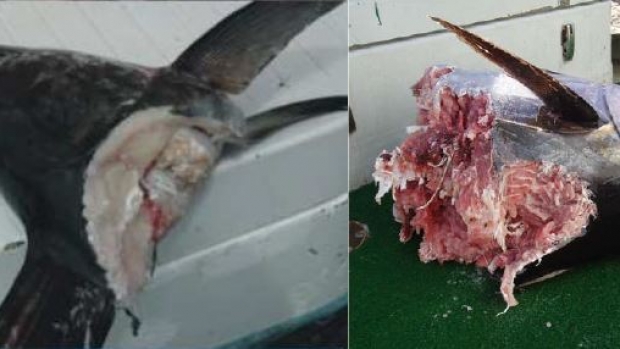Grants :: Small Grant Facilities :: Mediating marine mammal depredation to enable sustainable long/drop lines fisheries in Seychelles
Mediating marine mammal depredation to enable sustainable long/drop lines fisheries in Seychelles

Depredated fish catch from long-line fishing in the Seychell ... , Seychelles © MCSS, 2014
Objectives
Develop appropriate mitigation measures to protect fish catch from long-line/drop-line fishing while conserving protected species.
Background
Long-line/drop-line fisheries in Seychelles suffer one of the highest rates of depredation (the eating of the caught target fish or bait, by marine mammals or sharks) in the world, with losses of up to 21% of the catch. Such losses are not only financially damaging to the fishers and those who depend upon them (estimated at over 100,000 Euro per year), they also threaten food security. Similarly, tension increases during such losses, and activities to reduce mitigation can resort to indiscriminate killing of potential culprits, many of which are endangered and protected species.
The main cause of the problem is a general reduction of previously available food causing the predatory species to look for other food sources. Rapid learning potential in both marine mammals and some sharks to associate easy food with fishing operations greatly exacerbates this issue.
This project aims to address this by establishing the current scale of depredation across the industries’ boats and gear types, the marine mammal species involved in depredation attacks and the potential cues provoking the attacks. This will be accomplished by the design and implementation of a statistical survey of vessels, gear and volume of catches relative to depredation losses. Data will be gathered via on-board visual and acoustic surveys to evaluate species involved and potential cues for depredation attacks and by the subsequent development, implementation and iterative revision of mitigation processes. This will enable the assessment of appropriate mitigation measures to protect the catch, thereby safeguarding livelihoods and food security, while conserving protected and endangered species.
The Seychelles Exclusive Economic Zone stretches from 44° to 60°E and from 2° to 14°S .The project will mainly be implemented around the shelf edge areas surrounding the Inner
Island plateau where depths drop from 50 metres to over 2000 metres
Target beneficiaries
Crew (10 vessels) and families of licensed semi-industrial long-line and drop-line fishing .
Outputs
The project is designed to deliver these results:
- Current information on scale and dispersion of depredation is established.
- Appropriate mitigation measures to protect fish catch, while conserving protected species, are developed.
Contributions to cross-cutting themes
Climate change: The effects of climate change on fishing and also on the food chains of large marine predators, and hence on the incidence of depredation, is as yet unknown; however, by recording statistically valid data on the fishery, catch, depredation levels and physical and environmental factors, this project will effectively establish a baseline by which some influences of climate change can be monitored.
Gender: Fishing is a traditionally male dominated sector and while the project does not seek to address gender issues directly, the integration of female research and support staff on the project and their role in the development of methodology with the fishing community, will address the gender theme.
Project Facts
Country
Location
The Seychelles Plateau
Topic
Duration
1st Oct 2014 to 30th Sep 2015
MFF Grant Amount
SCR 286,800
Implementing Partner
Marine Conservation Society Seychelles (MCSS)
Dr David Rowat
Chairman and Director
Po Box 1299, Victoria, Mahe